The AMD Ryzen Threadripper 3960X and 3970X Review: 24 and 32 Cores on 7nm
by Dr. Ian Cutress, Andrei Frumusanu & Gavin Bonshor on November 25, 2019 9:05 AM ESTCPU Performance: Web and Legacy Tests
While more the focus of low-end and small form factor systems, web-based benchmarks are notoriously difficult to standardize. Modern web browsers are frequently updated, with no recourse to disable those updates, and as such there is difficulty in keeping a common platform. The fast paced nature of browser development means that version numbers (and performance) can change from week to week. Despite this, web tests are often a good measure of user experience: a lot of what most office work is today revolves around web applications, particularly email and office apps, but also interfaces and development environments. Our web tests include some of the industry standard tests, as well as a few popular but older tests.
We have also included our legacy benchmarks in this section, representing a stack of older code for popular benchmarks.
All of our benchmark results can also be found in our benchmark engine, Bench.
Speedometer 2: JavaScript Frameworks
Our newest web test is Speedometer 2, which is a accrued test over a series of javascript frameworks to do three simple things: built a list, enable each item in the list, and remove the list. All the frameworks implement the same visual cues, but obviously apply them from different coding angles.
Our test goes through the list of frameworks, and produces a final score indicative of ‘rpm’, one of the benchmarks internal metrics. We report this final score.
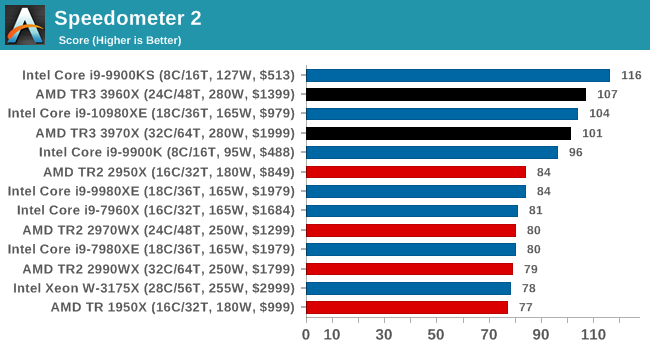
Google Octane 2.0: Core Web Compute
A popular web test for several years, but now no longer being updated, is Octane, developed by Google. Version 2.0 of the test performs the best part of two-dozen compute related tasks, such as regular expressions, cryptography, ray tracing, emulation, and Navier-Stokes physics calculations.
The test gives each sub-test a score and produces a geometric mean of the set as a final result. We run the full benchmark four times, and average the final results.
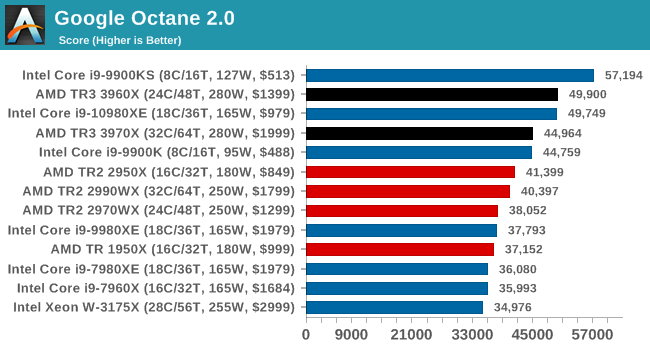
Mozilla Kraken 1.1: Core Web Compute
Even older than Octane is Kraken, this time developed by Mozilla. This is an older test that does similar computational mechanics, such as audio processing or image filtering. Kraken seems to produce a highly variable result depending on the browser version, as it is a test that is keenly optimized for.
The main benchmark runs through each of the sub-tests ten times and produces an average time to completion for each loop, given in milliseconds. We run the full benchmark four times and take an average of the time taken.
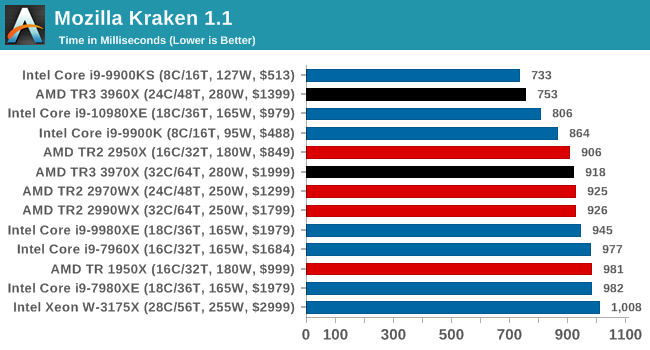
3DPM v1: Naïve Code Variant of 3DPM v2.1
The first legacy test in the suite is the first version of our 3DPM benchmark. This is the ultimate naïve version of the code, as if it was written by scientist with no knowledge of how computer hardware, compilers, or optimization works (which in fact, it was at the start). This represents a large body of scientific simulation out in the wild, where getting the answer is more important than it being fast (getting a result in 4 days is acceptable if it’s correct, rather than sending someone away for a year to learn to code and getting the result in 5 minutes).
In this version, the only real optimization was in the compiler flags (-O2, -fp:fast), compiling it in release mode, and enabling OpenMP in the main compute loops. The loops were not configured for function size, and one of the key slowdowns is false sharing in the cache. It also has long dependency chains based on the random number generation, which leads to relatively poor performance on specific compute microarchitectures.
3DPM v1 can be downloaded with our 3DPM v2 code here: 3DPMv2.1.rar (13.0 MB)
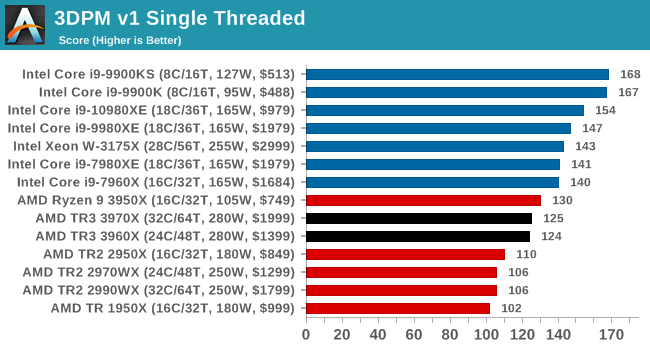
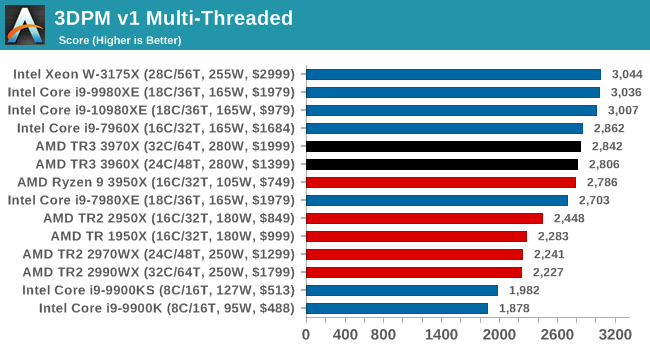
x264 HD 3.0: Older Transcode Test
This transcoding test is super old, and was used by Anand back in the day of Pentium 4 and Athlon II processors. Here a standardized 720p video is transcoded with a two-pass conversion, with the benchmark showing the frames-per-second of each pass. This benchmark is single-threaded, and between some micro-architectures we seem to actually hit an instructions-per-clock wall.
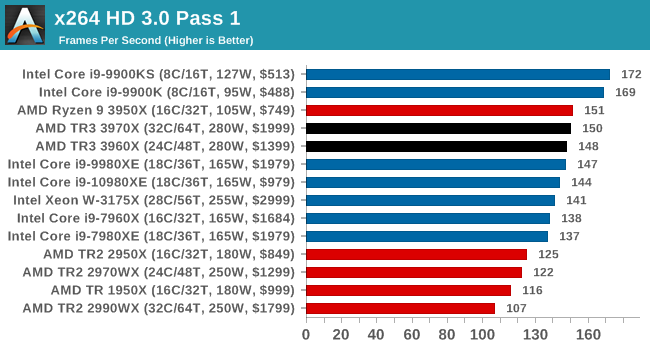
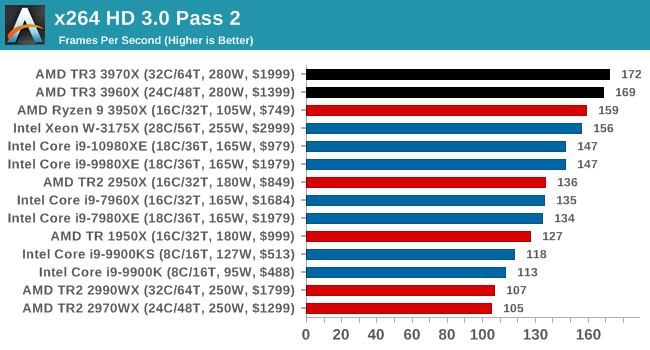
GeekBench4: Synthetics
A common tool for cross-platform testing between mobile, PC, and Mac, GeekBench 4 is an ultimate exercise in synthetic testing across a range of algorithms looking for peak throughput. Tests include encryption, compression, fast Fourier transform, memory operations, n-body physics, matrix operations, histogram manipulation, and HTML parsing.
I’m including this test due to popular demand, although the results do come across as overly synthetic, and a lot of users often put a lot of weight behind the test due to the fact that it is compiled across different platforms (although with different compilers).
We record the main subtest scores (Crypto, Integer, Floating Point, Memory) in our benchmark database, but for the review we post the overall single and multi-threaded results.
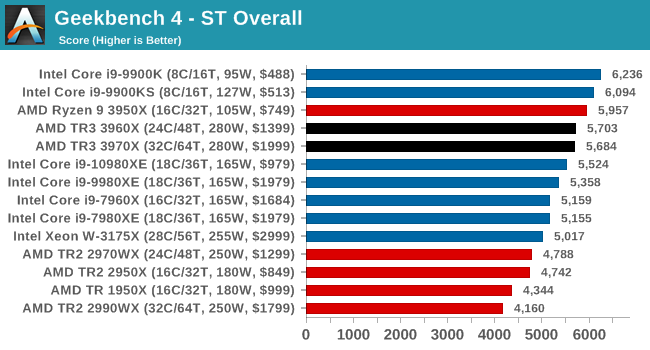
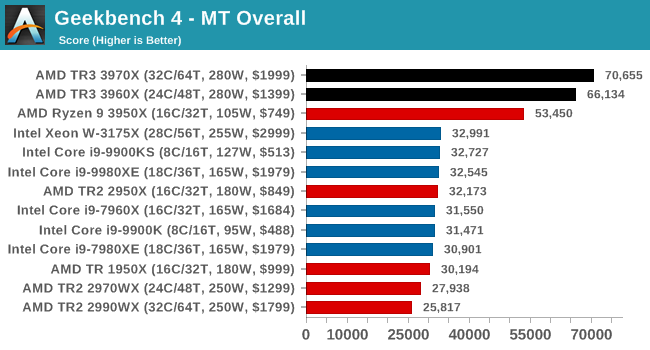










245 Comments
View All Comments
mazz7 - Monday, November 25, 2019 - link
I really thought that Anandtech viewers are smarter than others, but then i see the comments, I am really wrong about that ;pmartixy - Monday, November 25, 2019 - link
The amount of happy this makes me...Also, I'm glad to see y-cruncher in the test suite. It's been my goto power virus/perf benchmark since around the 0.5 versions.
boltcranck - Tuesday, November 26, 2019 - link
World of Tanks enCore is outdated, you should benchmark with the WoT enCoreRTwolfesteinabhi - Tuesday, November 26, 2019 - link
there us a cositant typo at several places .... 3960X is typed as 3950XTorrijos - Tuesday, November 26, 2019 - link
It would be interesting to present all the benchmarks in 2 graphs... The raw results, and then Bench/$.In order to have an idea of the financial benefits.
CraigIsSatoshiBsvIsBitcoin - Tuesday, November 26, 2019 - link
Looking forward to picking up a 64 core CPU for $200 in a couple of years..peevee - Tuesday, November 26, 2019 - link
Don't hold you breath. Well, maybe 64 in-order RISC cores. Not the same at all.liquid_c - Tuesday, November 26, 2019 - link
Gotta love how many people praise AMD and sh*t on Intel for this but just as many seem to forget that when AMD was in Intel’s place, they overcharged *way* more than Intel did / does. As a matter of fact, the 32c/64t gen3 TR costs 200$ more than last gen’s similar offering. The second AMD felt they caught a gust of wind, they slowly started inflating prices.I’m all for competition and i would love it if both Intel and AMD had some sort of control over final pricing (in my country, the 3900x costs ~700$...) but i have this distinct feeling that if things continue at this pace, AMD will become Intel 2.0, pricing and milking wise.
Bottom line - neither of the two are truly consumer friendly but memories fade and time tells its story at a slow pace.
M O B - Tuesday, November 26, 2019 - link
AMD isn't in Intel's place, and the last time there were (2003), they didn't overcharge.As for selling a 32-core CPU for $2000 on a brand new process node that also offers ECC, PCIe 4.0, and is 100W under the closest competitor--that isn't a position Intel has been in before. Even in 2012 Intel wasn't destroying the competition so utterly in single-core, multi-core, node, and feature-set at virtually ever price point.
What Intel will sell you is a 3 year old process node for $2000 like they did for the last 2 years. Rest assured that if Intel was in AMD's shoes right now that 32-core would be $3,000 and not have ECC support.
Plus, AMD has a $750 16-core that is plenty for the enthusiast market. This is truly a workstations CPU.
Xyler94 - Tuesday, November 26, 2019 - link
And Intel gets a pass on the 28 core overclocked Xeon that is priced at almost 4K?Listen, everyone wants to pay nothing for their products. But this chip isn't exactly cheap, and AMD is giving a heck of a deal on a processor Intel can't hope to make with their current processes. Remember that AMD's 64 core behemoth of a CPU only costs 7k, while Intel charges 10K for... 28 cores.